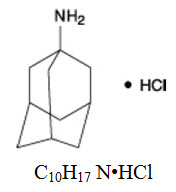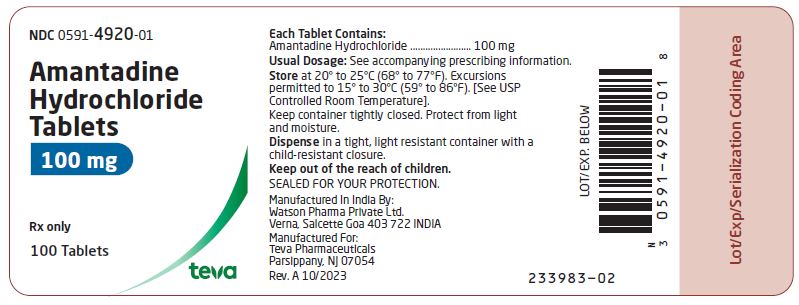Drug Catalog - Product Detail
AMANTADINE HCL 100MG TB 500CT
| NDC | Mfr | Size | Str | Form |
|---|---|---|---|---|
| 00591-4920-05 | ACTAVIS PHARMA | 500 | 100MG | TABLET |
PACKAGE FILES


Generic Name
AMANTADINE HYDROCHLORIDE
Substance Name
AMANTADINE HYDROCHLORIDE
Product Type
HUMAN PRESCRIPTION DRUG
Route
ORAL
Application Number
ANDA208096
Description
DESCRIPTION Amantadine hydrochloride, USP is designated generically as amantadine hydrochloride, USP and chemically as 1-adamantanamine hydrochloride. Amantadine hydrochloride, USP is a stable white or nearly white crystalline powder, freely soluble in water and soluble in alcohol and in chloroform. Amantadine hydrochloride, USP has pharmacological actions as both an anti-Parkinson and an antiviral drug. Each tablet intended for oral administration contains 100 mg amantadine hydrochloride, USP and has the following inactive ingredients: microcrystalline cellulose, povidone, sodium starch glycolate, magnesium stearate and colloidal silicon dioxide. structural formula
How Supplied
HOW SUPPLIED Amantadine hydrochloride tablets are available as white to off white, round shaped, uncoated tablets debossed with " A85 " on one side and plain on the other side as follows: Bottles of 100 (NDC 0591-4920-01) Bottles of 500 (NDC 0591-4920-05) Store at 20° to 25°C (68° to 77°F). Excursions permitted to 15° to 30°C (59° to 86°F). [See USP Controlled Room Temperature]. Dispense in a tight, light resistant container as defined in the USP, with child-resistant closure (as required). Keep out of reach of children.
Indications & Usage
INDICATIONS AND USAGE Amantadine hydrochloride tablets are indicated for the prophylaxis and treatment of signs and symptoms of infection caused by various strains of influenza A virus. Amantadine hydrochloride tablets are also indicated in the treatment of parkinsonism and drug-induced extrapyramidal reactions. Influenza A Prophylaxis Amantadine hydrochloride tablets are indicated for chemoprophylaxis against signs and symptoms of influenza A virus infection. Because amantadine hydrochloride tablets do not completely prevent the host immune response to influenza A infection, individuals who take this drug may still develop immune responses to natural disease or vaccination and may be protected when later exposed to antigenically related viruses. Following vaccination during an influenza A outbreak, amantadine hydrochloride tablets prophylaxis should be considered for the 2 to 4 week time period required to develop an antibody response. Influenza A Treatment Amantadine hydrochloride tablets are also indicated in the treatment of uncomplicated respiratory tract illness caused by influenza A virus strains especially when administered early in the course of illness. There are no well-controlled clinical studies demonstrating that treatment with amantadine hydrochloride tablets will avoid the development of influenza A virus pneumonitis or other complications in high risk patients. There is no clinical evidence indicating that amantadine hydrochloride tablets are effective in the prophylaxis or treatment of viral respiratory tract illnesses other than those caused by influenza A virus strains. The following points should be considered before initiating treatment or prophylaxis with amantadine hydrochloride tablets: Amantadine hydrochloride tablets are not a substitute for early vaccination on an annual basis as recommended by the Centers for Disease Control and Prevention Advisory Committee on Immunization Practices. Influenza viruses change over time. Emergence of resistance mutations could decrease drug effectiveness. Other factors (for example, changes in viral virulence) might also diminish clinical benefit of antiviral drugs. Prescribers should consider available information on influenza drug susceptibility patterns and treatment effects when deciding whether to use amantadine hydrochloride tablets. Parkinson's Disease / Syndrome Amantadine hydrochloride tablets are indicated in the treatment of idiopathic Parkinson's disease (Paralysis Agitans), postencephalitic parkinsonism, and symptomatic parkinsonism which may follow injury to the nervous system by carbon monoxide intoxication. It is indicated in those elderly patients believed to develop parkinsonism in association with cerebral arteriosclerosis. In the treatment of Parkinson's disease, amantadine hydrochloride tablets are less effective than levodopa, (-)-3-(3,4- dihydroxyphenyl)-L-alanine, and its efficacy in comparison with the anticholinergic antiparkinson drugs has not yet been established. Drug-Induced Extrapyramidal Reactions Amantadine hydrochloride tablets are indicated in the treatment of drug-induced extrapyramidal reactions. Although anticholinergic-type side effects have been noted with amantadine hydrochloride tablets when used in patients with drug-induced extrapyramidal reactions, there is a lower incidence of these side effects than that observed with the anticholinergic antiparkinson drugs.
Dosage and Administration
DOSAGE AND ADMINISTRATION The dose of amantadine hydrochloride tablets may need reduction in patients with congestive heart failure, peripheral edema, orthostatic hypotension, or impaired renal function (see Dosage for Impaired Renal Function ). Dosage for Prophylaxis and Treatment of Uncomplicated Influenza A Virus Illness Adult The adult daily dosage of amantadine hydrochloride tablets is 200 mg; two 100 mg tablets as a single daily dose. The daily dosage may be split into one tablet of 100 mg twice a day. If central nervous system effects develop in once-a-day dosage, a split dosage schedule may reduce such complaints. In persons 65 years of age or older, the daily dosage of amantadine hydrochloride tablets is 100 mg. A 100 mg daily dose has also been shown in experimental challenge studies to be effective as prophylaxis in healthy adults who are not at high risk for influenza-related complications. However, it has not been demonstrated that a 100 mg daily dose is as effective as a 200 mg daily dose for prophylaxis, nor has the 100 mg daily dose been studied in the treatment of acute influenza illness. In recent clinical trials, the incidence of central nervous system (CNS) side effects associated with the 100 mg daily dose was at or near the level of placebo. The 100 mg dose is recommended for persons who have demonstrated intolerance to 200 mg of amantadine hydrochloride tablets daily because of CNS or other toxicities. Pediatric Patients 1 yr. to 9 yrs. of age The total daily dose should be calculated on the basis of 2 to 4 mg/lb/day (4.4 to 8.8 mg/kg/day), but not to exceed 150 mg per day. 9 yrs. to 12 yrs. of age The total daily dose is 200 mg given as one tablet of 100 mg twice a day. The 100 mg daily dose has not been studied in this pediatric population. Therefore, there are no data which demonstrate that this dose is as effective as or is safer than the 200 mg daily dose in this patient population. Prophylactic dosing should be started in anticipation of an influenza A outbreak and before or after contact with individuals with influenza A virus respiratory tract illness. Amantadine hydrochloride tablets should be continued daily for at least 10 days following a known exposure. If amantadine hydrochloride tablets are used chemoprophylactically in conjunction with inactivated influenza A virus vaccine until protective antibody responses develop, then it should be administered for 2 to 4 weeks after the vaccine has been given. When inactivated influenza A virus vaccine is unavailable or contraindicated, amantadine hydrochloride tablets should be administered for the duration of known influenza A in the community because of repeated and unknown exposure. Treatment of influenza A virus illness should be started as soon as possible, preferably within 24 to 48 hours after onset of signs and symptoms, and should be continued for 24 to 48 hours after the disappearance of signs and symptoms. Dosage for Parkinsonism Adult The usual dose of amantadine hydrochloride tablets is 100 mg twice a day when used alone. Amantadine hydrochloride tablets have an onset of action usually within 48 hours. The initial dose of amantadine hydrochloride tablets is 100 mg daily for patients with serious associated medical illnesses or who are receiving high doses of other antiparkinson drugs. After one to several weeks at 100 mg once daily, the dose may be increased to 100 mg twice daily, if necessary. Occasionally, patients whose responses are not optimal with amantadine hydrochloride tablets at 200 mg daily may benefit from an increase up to 400 mg daily in divided doses. However, such patients should be supervised closely by their physicians. Patients initially deriving benefit from amantadine hydrochloride tablets not uncommonly experience a fall-off of effectiveness after a few months. Benefit may be regained by increasing the dose to 300 mg daily. Alternatively, temporary discontinuation of amantadine hydrochloride tablets for several weeks, followed by reinitiation of the drug, may result in regaining benefit in some patients. A decision to use other antiparkinson drugs may be necessary. Dosage for the Concomitant Therapy Some patients who do not respond to anticholinergic antiparkinson drugs may respond to amantadine hydrochloride tablets. When amantadine hydrochloride tablets or anticholinergic antiparkinson drugs are each used with marginal benefit, concomitant use may produce additional benefit. When amantadine hydrochloride tablets and levodopa are initiated concurrently, the patient can exhibit rapid therapeutic benefits. Amantadine hydrochloride tablets should be held constant at 100 mg daily or twice daily while the daily dose of levodopa is gradually increased to optimal benefit. When amantadine hydrochloride tablets are added to optimal well-tolerated doses of levodopa, additional benefit may result, including smoothing out the fluctuations in improvement which sometimes occur in patients on levodopa alone. Patients who require a reduction in their usual dose of levodopa because of development of side effects may possibly regain lost benefit with the addition of amantadine hydrochloride tablets. Dosage for Drug-Induced Extrapyramidal Reactions Adult The usual dose of amantadine hydrochloride tablets is 100 mg twice a day. Occasionally, patients whose responses are not optimal with amantadine hydrochloride tablets at 200 mg daily may benefit from an increase up to 300 mg daily in divided doses. Dosage for Impaired Renal Function Depending upon creatinine clearance, the following dosage adjustments are recommended: CREATININE CLEARANCE (mL/min/1.73 m 2 ) AMANTADINE HYDROCHLORIDE TABLETS DOSAGE 30 to 50 200 mg 1st day and 100 mg each day thereafter 15 to 29 200 mg 1st day followed by 100 mg on alternate days <15 200 mg every 7 days The recommended dosage for patients on hemodialysis is 200 mg every 7 days.
